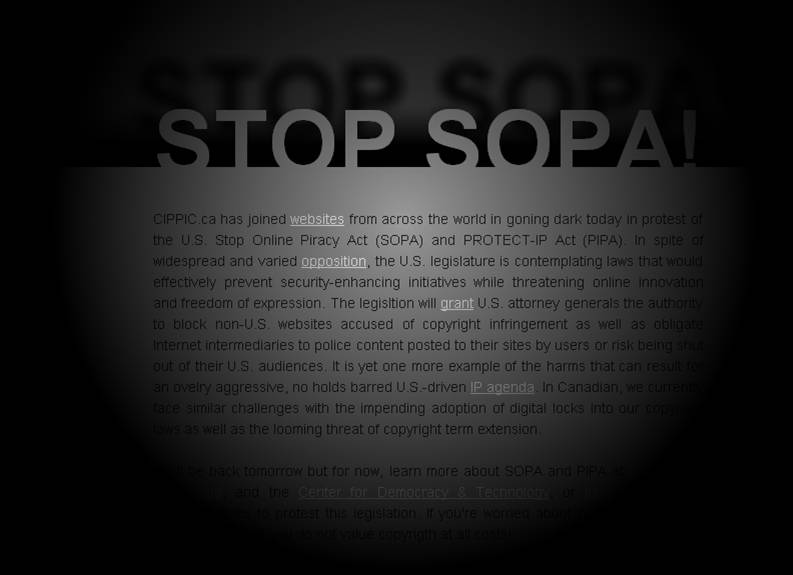SOPA Black-out
| January 19, 2012
If you visited our website yesterday, you most likely noticed the following black-out page covering the entire cippic.ca site:
CIPPIC.ca joined countless other websites in going entirely dark, or at least notionally censoring, our web pages for the day. This action was part of a worldwide protest against the U.S. Stop Online Piracy Act (SOPA) and PROTECT-IP Act (PIPA). The black-outs aimed to give web users a feel for what the internet could become under the purview of the proposed U.S. legislation -- that is, an internet where you might attempt to visit your favourite website, only to find that it was censored and blocked on the basis of aggressive U.S. content policies.
In spite of this widespread and varied opposition, the U.S. legislature is still considering these laws that would effectively prevent security-enhancing initiatives while threatening online innovation and freedom of expression (fortunately, many congressional representatives have already dropped support for the bills in the wake of these protests). Canadians should be glad of this, as the potential impact of the legislation does not stop at U.S. borders. The legislation places many wholly Canadian-owned and Canadian-run websites under the jurisdiction of U.S. laws. SOPA would not only put dot-ca, dot-uk, and dot-info domains within the purview of the legislation, but also all IP addresses allocated under ARIN, the American Registry for Internet Numbers. This registry notably includes Canadian IP-addresses (the address assigned to you or any Canadian server every time you go online).
This extra-territoriality is deeply troubling, particularly when applied to the Internet. As the Internet is a shared international medium, we cannot have individual countries imposing their laws on all others in such heavy-handed ways. Laws should be enforced online, but states must respect other country's rights to adopt their own standards. The very premise of SOPA/PIPA is that the U.S. has the right to block sites that infringe its copyright laws, regardless of whether these activities violate local laws or not. Aside from this legislation this prevailing U.S. attitude is evident in other IP enforcement activities such as the Department of Homeland Security's ICE seizure of Rojadirecta.org, a Spanish search site that had been declared legal twice by local Spanish courts. Jurisdictional questions are always tricky, but if every country follows the U.S. lead here and starts applying its own priorities to the Internet, it will not remain a globally interconnected tool for long. Worse still, SOPA appears to impose more rigid liability standards on non-U.S. intermediary websites than it does on its own!
Canada is currently facing the impacts of other aspects of this expansive U.S. IP agenda, of which SOPA/PIPA are symptomatic examples. Current challenges for Canadians includ the impending adoption of protection for digital locks into our copyright regime and the looming threat of term extension obligations through Trans-Pacific Partnership negotiations.
If you're worried about freedom of expression or copyright generally, there are several steps you can take:
- Speak out against SOPA. Speak out against Canada's importation of U.S. copyright policy. Call upon your MP's to take a stand, telling them that you value freedom of expression and an open internet -- not copyright at all costs!
- Adopt and support peer-to-peer alternatives that could replace the existing top-down and easy-to-suppress choke points of our internet infrastructure. In order to secure a way around the censoring of websites that Internet providers may put in place, use an "onion-router" such as Tor. If you operate a website, also check out Namecoin, a peer-to-peer DNS system based on bitcoin's "block-chain" technology.
- Learn more about SOPA and PIPA at EFF, Public Knowledge, and the Center for Democracy & Technology.

